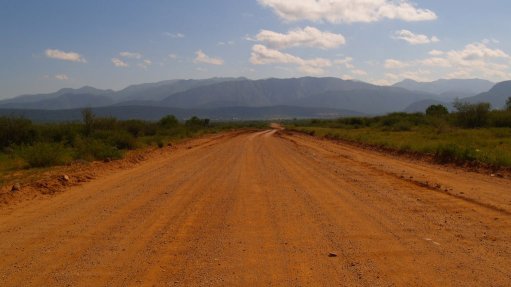Air Products to leverage expertise to bolster South Africa’s hydrogen mobility ecosystem

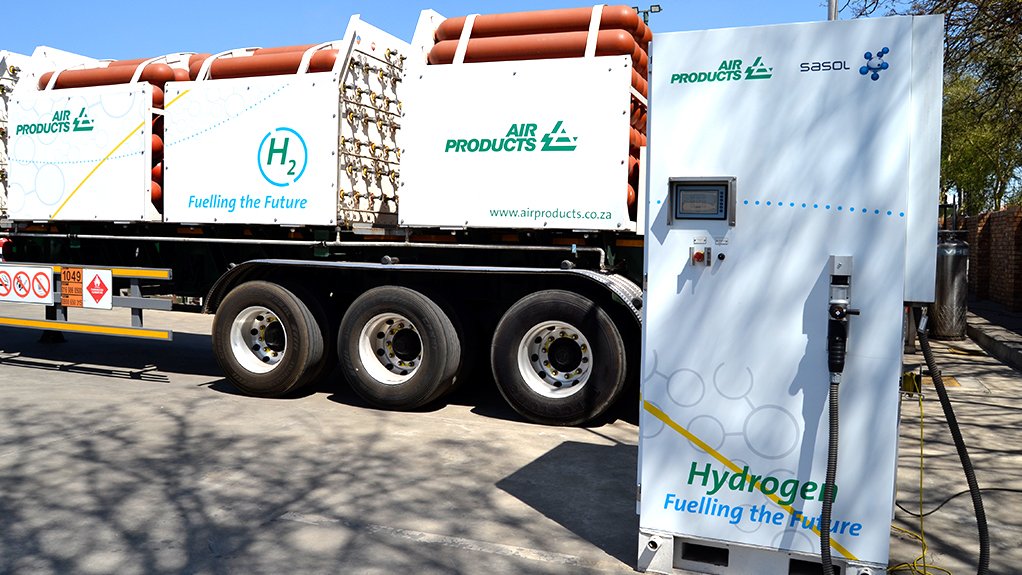
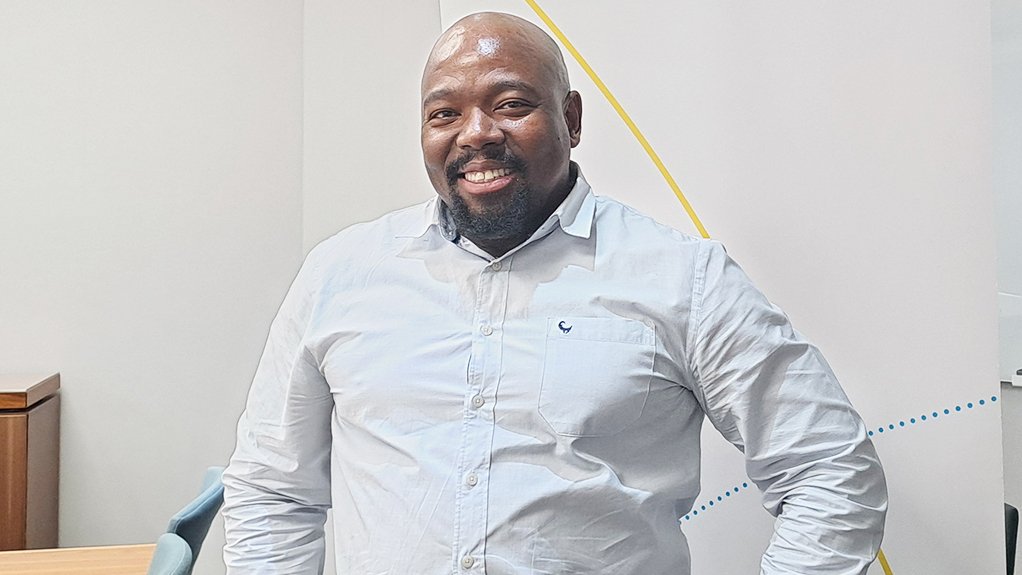
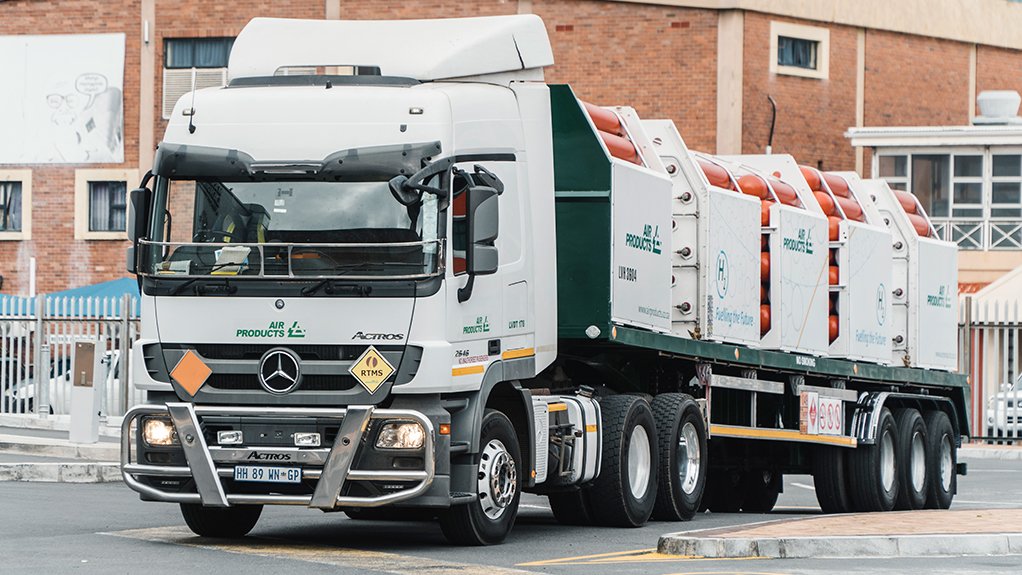
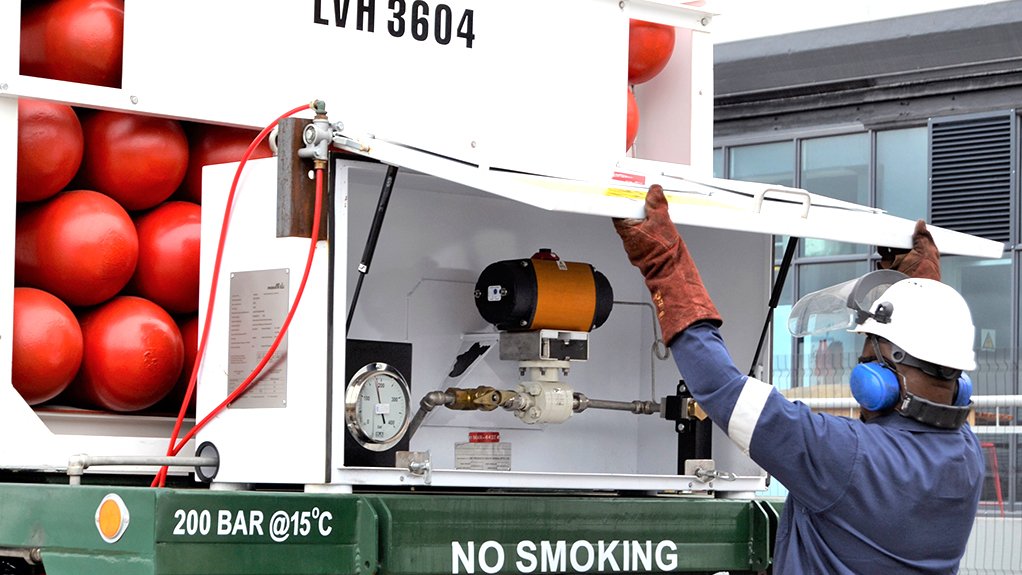
Air Products hydrogen dispensing unit and trailer
Air Products on-sites general manager Dumisa Gina
Photo by Creamer Media's Tasneem Bulbulia
Air Products hydrogen trailer
Air Products hydrogen trailer back view
Industrial and specialty gas manufacturer and supplier Air Products South Africa is looking to leverage on the group’s global expertise and experience in the hydrogen industry, as well as its technology offering, to play a pivotal role in establishing a sustainable and thriving hydrogen mobility ecosystem in the country.
Air Products on-site general manager Dumisa Gina told Engineering News in an exclusive interview that Air Products, headquartered in the US, was the leading supplier of hydrogen globally, and boasted an extensive patent portfolio related to hydrogen supply and dispensing technology.
He noted that, locally, it was in a favourable position as it could leverage expertise and learnings from the global group.
Locally, the work the company had undertaken included partnering with petrochemical company Sasol and automotive manufacturers Toyota and BMW to demonstrate hydrogen in the local context, Gina informed.
In October last year, Toyota South Africa Motors, Sasol and Air Products South Africa unveiled South Africa’s first on-road hydrogen mobility ecosystem proof-of-concept demonstration, at the Smarter Mobility Africa Summit in Johannesburg.
The proof-of-concept used a second-generation Toyota Mirai fuel cell electric vehicle (FCEV) fuelled with hydrogen molecules from Sasol, processed by the Air Products pressure swing absorber plant. Air Products, leveraging its distribution infrastructure and the collaboration with Sasol in providing the dispensing technology, facilitated and enabled the fuelling of the FCEV to take passengers around a test track.
Gina emphasised that developing the country’s hydrogen mobility ecosystem would require such partnerships. “There is a need to grow the ecosystem beyond our borders to ensure the establishment of hydrogen infrastructure that will enable green corridors in the Southern African Development Community (SADC) region.”
Gina acclaimed that the company was able to successfully showcase its technology at these events, and how it could be used to successfully refuel hydrogen vehicles as well as the power of collaboration to overcome “grand” challenges.
“The big success for us was to display the technology and show that hydrogen is safe to use, and that it is available,” Gina said, adding that the events demonstrated key stakeholders cooperating to achieve the goal of supplying hydrogen for the mobility space.
He expanded that the demonstration exhibited that high-pressure hydrogen was not as dangerous as people perceived, and that it could be used effectively as a fuel.
“We’ve been receiving a lot of inquiries about hydrogen supply and technology since then, and the demonstrations also sold the idea to several big stakeholders, including government,” Gina avered.
Moreover, he highlighted that the demonstration showcased Air Products’ ability to make hydrogen available anywhere in the country where it was required.
“We have state-of-the-art tube trailers, cylinders, dispensers and high compression equipment. Our view is that we have the product and technology and want to position ourselves as an enabler, for any organisation who would like to conduct trials with hydrogen – we can make it happen in South Africa, as well as beyond our borders.”
Gina emphasises that the opportunity for South Africa in hydrogen exists particularly in the mobility space, to use hydrogen as an energy carrier that fuels vehicles. Currently, hydrogen is used as a utility in the petrochemical industry in the metal, glass and mining processing industries for its chemical properties (mainly for reduction).
He said hydrogen was an energy carrier would also deliver environmental benefits, by reducing harmful emissions from vehicles, and was aligned with Air Products’ sustainability strategy.
However, Gina pointed out that the hydrogen mobility industry was still in early development in the country, as it was currently in the phase of undertaking demonstrations.
Gina explained that regions where this had taken off were those where there had been considerable government intervention and incentives, such as in Namibia, in California in the US, and some countries in Europe.
However, he pointed out that hydrogen was not as bankable in South Africa as in some of the other regions, as the country did not have the luxury to fund it or implement it owing to many competing social challenges and the well-known power issues taking priority.
The green hydrogen production process itself was very power intensive. Transporting hydrogen to the end-user was an even bigger challenge, with the liquefaction and compression being very costly. The ammonia synthesis process is high temperature and pressure extracting a lot of energy which added to the overall costs, Gina explained.
“This really forces us to be creative in terms of how we approach this. We are currently exploring the possibility of using existing assets and capabilities to grow the hydrogen economy organically with our partners as none of us can overcome this grand challenge by ourselves. The growth of the hydrogen economy requires a collaborative approach with multiple stakeholders to tailor-make a solution that will be suitable within the South African context as well as the SADC region”.
Gina mentioned another constraint to the hydrogen mobility industry was the availability of vehicles. “The manufacturers would be targeting Europe first, and then only bringing the vehicles to Africa,” he pointed out. Gina explained that car manufacturers needed to have the comfort that there was infrastructure locally to fuel these vehicles.
“It’s a chicken and egg situation, as we cannot put the infrastructure in place if there are no vehicles available to make use of it yet.”
On a more positive note, Gina said that, as the cost of renewable energy declined in the future, and electrolysers and fuel cells become more widely produced, it would become more affordable to produce and transport hydrogen.
He also pointed out that the country had the resources for the required renewable energy, and the mining industry had done a lot of work to demonstrate the future role of platinum group metals in electrolysis.
Gina also highlighted that the country had the skills locally to support the development of the hydrogen economy. “With the leadership of the Department of Science and Innovation we’re well positioned compared to other countries for our hydrogen economy to take off.”
Over and above its work in furthering hydrogen in the mobility space in the country, Gina informed that Air Products was working with companies such as Bambili Energy to mitigate the current power challenges, where hydrogen fuel cells were used for backup power. He elaborateed that there were opportunities to use hydrogen to replace diesel generators in malls, estates and residential properties, once it reached a point where it was economically viable to do so.
Article Enquiry
Email Article
Save Article
Feedback
To advertise email advertising@creamermedia.co.za or click here
Announcements
What's On
Subscribe to improve your user experience...
Option 1 (equivalent of R125 a month):
Receive a weekly copy of Creamer Media's Engineering News & Mining Weekly magazine
(print copy for those in South Africa and e-magazine for those outside of South Africa)
Receive daily email newsletters
Access to full search results
Access archive of magazine back copies
Access to Projects in Progress
Access to ONE Research Report of your choice in PDF format
Option 2 (equivalent of R375 a month):
All benefits from Option 1
PLUS
Access to Creamer Media's Research Channel Africa for ALL Research Reports, in PDF format, on various industrial and mining sectors
including Electricity; Water; Energy Transition; Hydrogen; Roads, Rail and Ports; Coal; Gold; Platinum; Battery Metals; etc.
Already a subscriber?
Forgotten your password?
Receive weekly copy of Creamer Media's Engineering News & Mining Weekly magazine (print copy for those in South Africa and e-magazine for those outside of South Africa)
➕
Recieve daily email newsletters
➕
Access to full search results
➕
Access archive of magazine back copies
➕
Access to Projects in Progress
➕
Access to ONE Research Report of your choice in PDF format
RESEARCH CHANNEL AFRICA
R4500 (equivalent of R375 a month)
SUBSCRIBEAll benefits from Option 1
➕
Access to Creamer Media's Research Channel Africa for ALL Research Reports on various industrial and mining sectors, in PDF format, including on:
Electricity
➕
Water
➕
Energy Transition
➕
Hydrogen
➕
Roads, Rail and Ports
➕
Coal
➕
Gold
➕
Platinum
➕
Battery Metals
➕
etc.
Receive all benefits from Option 1 or Option 2 delivered to numerous people at your company
➕
Multiple User names and Passwords for simultaneous log-ins
➕
Intranet integration access to all in your organisation















